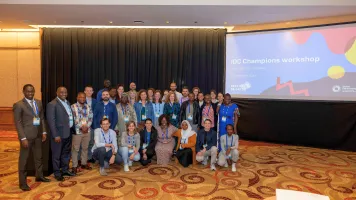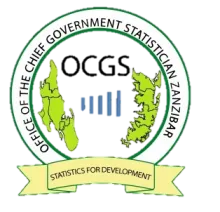The Government of Zanzibar has taken a bold, data-driven approach to address the issue of gender-based violence (GBV). Recognizing that violence against women and children is pervasive, but not inevitable, Zanzibar has prioritized the collection of timely (monthly) and accurate data to understand the scale of the problem and drive targeted interventions.
Uncovering the scale of GBV
To shed light on the extent of GBV, Office of the Chief Government Statistician Zanzibar (OCGS) began producing and disseminating comprehensive GBV data from 2020. This marked a significant milestone, as it was the first time such data was available to provide valuable insights on the scale of the issue. In 2020, the number of GBV incidents reported to the police was 1,363; in 2021, 1,222 incidents were reported, and in 2022, this figure was 1,360.
As an Inclusive Data Charter (IDC) Champion, OCGS formulated and implemented an action plan to build its capacity, coordination, and dissemination of gender data, with a specific focus on crime statistics for GBV reporting.
“Timely, accurate data is critical to addressing gender-based violence in Zanzibar because we need to understand the scale of the issue, and exactly who is most affected, where, and for what reasons,” says Salum Kassim Ali, Chief Government Statistician. “Data also helps us to communicate this issue in a different way, which is essential to tackling the stigma and social tolerance around violence.”
Putting data into context
The Government in Zanzibar also recognizes that GBV data is complicated and doesn’t paint the full picture alone. Underreporting of cases through the official channels remains a concern that calls into question the accuracy and completeness of the data. Drawing conclusions with data alone is complicated as the same data set can tell many stories – for example, rising numbers of GBV cases could indicate increased awareness and willingness to report cases, or this could reflect an actual increase in the number of cases. So it’s critical that GBV data is contextualized with expert opinions and community reflections. Equally, there’s recognition that data points can be off-putting unless there’s a concerted effort to build people’s skills and confidence to understand and use them.
The Government of Zanzibar has taken an integrated approach involving local leaders (Sheha), civil society, UN agencies, and the media, using data, community engagement, and other interventions to raise awareness and shift social expectations and tolerance around GBV. Ultimately, data is an important but complex piece of the puzzle.
Part of OCGS’ monthly release is a complex communications strategy ensuring that the data released is disseminated to those who need it most. Monthly press conferences allow journalists to get the latest information on GBV data and have their questions answered by those compiling the figures, ensuring a transparent and accountable process. This has also led to a positive feedback loop by which OCGS is now invited to participate in more public events on the topic, for example the 16 Days of Activism Against Gender-Based Violence. This cycle is ensuring that GBV remains high on the agenda in Zanzibar, but the inclusion of OCGS guarantees that data is at the heart of those conversations.
Community members have become aware that OCGS is producing a report on a monthly basis and so, most of them are very curious to know how many cases have happened.
- Zaina Salum Abdulla, Tanzania Media Women’s Association
Strengthening public awareness and engagement
OCGS’ willingness to participate in public dialogue on the subject is contributing to increased trust throughout the crime reporting process, from reporting to police through to conviction rates being published. With an issue like GBV, where underreporting is a key concern due to a perceived lack of justice from the general public, building this trust in state institutions is a vital part of alleviating the wider problem.
Journalists and the wider media are also playing their part in engaging the wider public on the issue. Alongside reporting on the monthly statistical outputs, some media-based civil society groups have taken their own steps towards improving community engagement on GBV.
Tanzania Media Women’s Association (TAMWA) has carried out community sensitisation activities including workshops through its grassroots networks. These sessions offer an opportunity to raise the profile of GBV at the local level, and ensure that citizens know their rights. The organization also offers a platform for survivors to report crimes where they might not otherwise be able to through official channels.
Building a clearer picture
This puts TAMWA in a position to compare the data collected at the grassroots level to that which is published monthly by OCGS. Sometimes the figures align, but often there are discrepancies highlighting that there is still a way to go to overcome the underreporting of GBV in Zanzibar. TAMWA provides its data to OCGS to help improve official reporting processes, however, as seen in many instances globally there are challenges with incorporating non-official data into official reporting systems.
In the case of GBV, prevention is better than treatment, so these grassroots movements play a key role in both sensitizing the public to the issue and their rights around it, but also in creating more data to better inform how official indicators and actions are measuring up in practice.
Data literacy, however, remains a challenge. Part of TAMWA’s work involved training young media fellows on issues of GBV. This network of young journalists covers all of Zanzibar, enabling them to make targeted action to ensure follow-ups on reported stories. This approach is being used to try to ensure that each reported case receives justice through official processes.
Organizations like TAMWA play an important role in joining up the dots between official actions on GBV and those happening at the local level. TAMWA ensures that its work through the grassroots network is fed up to the national GBV Network. Through this work, TAMWA has helped officials to review policies and legislation affecting women’s and children’s rights around GBV. On the opposite side of the coin, TAMWA is using its media network, including access to local radio and television, to ensure that the latest situation is disseminated to the public across Tanzania.
Improving data collection and sharing
One notable achievement is the close collaboration between OCGS and the police commissioner to turn the paper-based incident reports into monthly GBV data releases. This close collaboration has not only facilitated data sharing, it has also supported the police in their efforts to digitize incident reporting. Equally, it has increased recognition about the importance of good quality data entry when it comes to completing incident reports.
“People don’t join the police expecting to be data collectors, but it is actually an incredibly important part of the job”, says Mathias Manyanza, Assistant Inspector. “Recently, many more police officers have come to understand that data is an important tool for preventing violence. We are recognizing and embracing our responsibility to generate quality data alongside OCGS. There is much to do to ensure communities know they can come forward to report GBV incidents, and when they do, that they are always taken seriously and a case is reported, but we are heading in the right direction.”
Shifting policies and practices
The efforts on data follow a long-term approach to advance more gender responsive policing in Zanzibar, with the introduction of gender desks in police stations, staffed by dedicated, specially trained detectives to handle incidents concerning women and children.
OCGS’ monthly data releases show not only the number of cases reported, but track cases all the way to the number of convictions. This helps increase transparency around the rate of conviction. While conviction rates remain low, in recent years, there have been several legislation changes in Zanzibar including setting up a special GBV court and speeding up trials involving sexual offenses, demonstrating the government’s commitment to effectively addressing the issue.
Building political will
The impact of Zanzibar's data-driven approach is evident across different ministries. The OCGS releases have galvanized interest and awareness of data across ministries, with several now having their own strategies in place to help tackle GBV.
Perhaps the best example of this movement across government can be seen in the Ministry for Education. The figures from OCGS suggest that GBV disproportionately affects children in Zanzibar, where in October 2022 85 percent of reported incidents involve children and teenagers. This is different to the story across the rest of Tanzania, where GBV tends to affect adults. The Ministry has therefore moved to include GBV within its integrated guidelines for teaching. These guidelines are the foundation on which the curriculum and teacher training is based. The result is that the issue of GBV is now being taught to children across Zanzibar, giving them a better understanding of their rights.
Conclusion
The work on improving data is just a small part of a growing movement within Zanzibar to end gender-based violence. It is part of a wider national dialogue on the topic, involving both state and non-state actors. The progress seen is a step in the direction towards a Zanzibar free from GBV, but there is still a long way to go. The national commitment to solving a problem has enabled a collective approach involving vastly different stakeholders; from the police to the public, line ministries to the media, each is playing their part in eradicating GBV. The government’s commitment to the IDC and OCGS’s leadership in utilizing statistics to address GBV also highlights the pivotal role of the NSO in tackling national priorities.
There are still areas where improvements are needed, data literacy and use are key examples, especially with the breadth of actors involved. Nevertheless, what is very clear from the progress to date is that data is a vital piece of the puzzle, sitting alongside other interventions to address GBV. OCGS has shown exceptional leadership on this front, being front and center of the progress to date. This highlights the key role that national statistics institutes can play in policy reform on national priorities like GBV.
OCGS has been committed to the Inclusive Data Charter since 2020. In 2023, the organization plans to review the progress made against its current action plan with the view to expand that set of inclusive data priorities in 2024.


